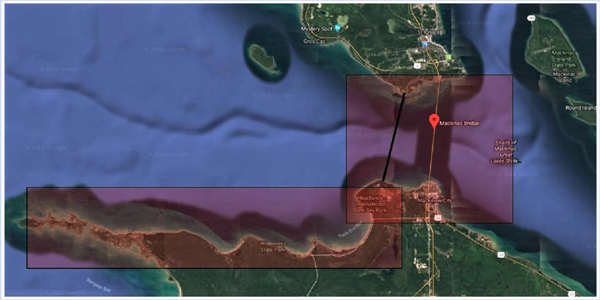By Amanda Durish Cook
MISO on Tuesday began using Wisconsin transmission to deliver electricity to Michigan’s Upper Peninsula after the failure of two of American Transmission Co.’s submarine cables in the Straits of Mackinaw.
The situation is not disrupting the RTO’s grid reliability, and there is adequate Wisconsin transmission capacity to offset the outage, according to MISO spokesperson Mark Adrian Brown.
“MISO continues to work closely with ATC to maintain electric reliability in the Upper Peninsula. Power to serve the Upper Peninsula of Michigan continues to be routed through Wisconsin, as is the normal flow of power into the Upper Peninsula, and there is ample transmission via the alternative route,” Brown told RTO Insider in an email.
ATC has said it does not know how long the outage will last. MISO may seek to reschedule future planned outages to ensure continued reliability depending on the duration, Brown said.
The company on Tuesday said it took the “unprecedented step” of shutting down two damaged underwater transmission lines that connect lower Michigan with the Upper Peninsula. The pair of 4-mile circuits were leaking a toxic, petroleum-based fluid used for insulation into the lake, and that “extreme weather conditions, including icing in the channel and on shore” prevented an investigation of the damage, according to the company.
ATC said the cables initially tripped offline about 30 seconds apart on April 1, although aerial patrols showed no visible damage to the overhead parts of the system. One of the cables was constructed in 1975, the other in 1990. According to the U.S. Coast Guard, about 600 gallons of hazardous petrochemical fluid leaked into the water.
The company has not established the cause of the damage and said the lines “cannot be repaired and have been rendered permanently inoperable.” The company said it will be checking on the condition of the other four cables it operates in the straits once weather permits. Upper Michigan this week experienced heavy snow and gusty winds.
ATC spokesperson Jackie Olson on Thursday said the company is testing the remaining cables to determine if they can be reconfigured to restore one of the circuits to operability.
“Our investigation as to the cause is ongoing; however, the weather conditions are such that we cannot get a remote submarine vehicle in to do an inspection any time soon,” Olson said.
“It was an extraordinary set of circumstances, but ultimately, the decision to shut down the cables had to be made,” said ATC Chief Operating Officer Mark Davis. “We will continue to investigate the cause of the incident, determine any necessary remediation efforts and continue communicating with the appropriate regulatory agencies.”
ATC said it is coordinating with MISO and Midwest Reliability Organization “to determine short-term and long-term solutions.” The company said it has notified multiple agencies of its decision to shut down the electrical cables, including EPA, the National Oceanic and Atmospheric Administration, the Coast Guard, U.S. Fish and Wildlife Service, Michigan Department of Environmental Quality, Michigan Department of Natural Resources and the Michigan Public Service Commission.
The Coast Guard on Wednesday said it established a unified command comprised of MDEQ members, county emergency managers, local native tribes, NOAA, FWS, EPA and ATC “to oversee the pollution response and mitigate any risks to the environment.” The Coast Guard said the maximum potential for the spill is more than 4,000 gallons, though ATC took pressure off the lines and fluid was not leaking as of April 4. The toxic risk to wildlife and drinking water is low, the Coast Guard said.




